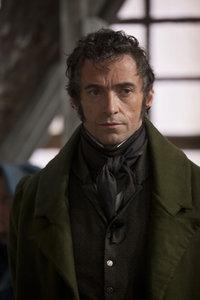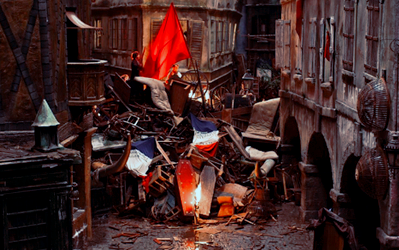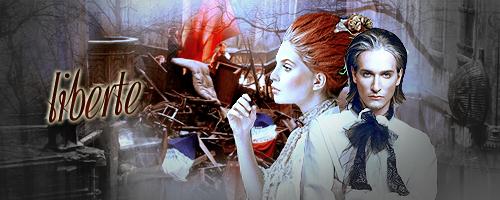Post by Deleted on Jan 1, 2013 15:37:48 GMT -5
| [atrb=cellSpacing,0,true][atrb=border,0,true][atrb=style, width: 460px; background-image: url(http://i44.tinypic.com/34fb0ns.jpg);-moz-border-radius: 0px 0px 0px 0px; -webkit-border-radius: 0px 0px 0px 0px; border: 4px ridge #7a9aa9, bTable][tr][cs=2] jean valjean. 58. french citizen. hugh jackman. | |
[rs=2] | Name: Jean Valjean Age: 58 Aliases: 24601, Monsieur Madeleine, the generous gentleman from the church Appearance: Jean Valjean is a strong, well-built man from the time that he spent working in the "chain gang" in prison for nineteen years. He has a pleasant face, but it has been hardened by the stresses of living a difficult life. Though handsome once, he has aged much by time and worry, with wrinkles forming around his hazel eyes and grey peppered into his curly hair. Age has not stooped him much, as he is still rather tall and imposing, which helped him look like a good mayor. He dresses a la mode, in the fashion of the day, now that he can afford to. This means that his dress is modest and not too showy because he does not want to draw attention to himself, but he does not want to draw attention to himself by looking outdated, either. Unfortunately for him, Valjean is a difficult man to ignore. Likes and dislikes: He likes mercy rather than harsh justice; he likes being able to take care of people rather than feeling helpless; he likes children and dislikes any mistreatment of them; he likes having enough money to be generous with it, and he dislikes people who are selfish with their wealth; he dislikes when people ask too many questions of him and likes instead feeling that he has control over a situation. PERSONALITY In discussions of philosophy, everyone is believed to have an "ultimate good" - the thing one values over everything else, and would sacrifice everything for. Though Jean Valjean's ultimate good has changed over the years, his determination in pursuing, or protecting, it has not wavered. He is very protective, whether over his sister and her son, his citizens while the mayor of Paris, or his adopted daughter Cosette. He is even protective of people he does not like or who have been cruel to him. At one point in time, he had only to protect himself: he was very tenacious, though always unsuccessful, in attempting to escape from prison. He also stole silverware from the bishop for his own sake, while stealing bread - the crime for which he was imprisoned - was for the sake of his sister and nephew. He considered that the low point in his life, one of the few times that he had actually acted upon a dark impulse. Yes, nineteen years of hard labor in prison had certainly hardened him. However, it had also shown him that the law is not the only way to live. It reinforced his desire to be merciful and kind, as Jesus was to all humanity by dying on the cross and taking the penalty of sin. Unlike the Messiah, Valjean certainly did not live a perfect life. He has sometimes let other people take the blame for his own mistakes, such as when Fantine was unjustly fired on his watch, but he redeemed himself in a similar circumstance by choosing to reveal himself as Valjean rather than let a stranger go to prison in his place. Another one of Valjean's failings is his impulsiveness. It has gotten the better of him a time or two, but he has been better about controlling his temper. His biggest weakness, however, is his desire to control people and circumstances. Some would certainly call him arrogant, for believing himself to be above the law - but he believes there is a higher law, one that ranks mercy even more highly than justice. He has few qualms about doing bad things for the right reasons, like stealing bread, or breaking parole and evading arrest, or lying about his identity. He does not necessarily see it as a bad thing, because skill and quick thinking allowed him to save Cosette, and others as well. However, not everyone likes being controlled; though it was normal for the time period for Valjean to have complete control over Cosette, he also carefully monitored the information she had about his past, and his secrecy was the only point of contention in their otherwise wonderful father-daughter relationship. Jean Valjean is not a man to stand idly by and let things happen; he is as strong mentally as he is physically. Though almost inhumanly strong for his age as a result of all his labor, and an excellent shot, Valjean refuses to take a life, and will probably refuse to take a life even when things get tense for him, because he is determined to be merciful and is generous to a fault, even to the point of self-sacrifice. It is possible for Valjean to both be strong and gentle, fierce and merciful. HISTORY Valjean's personality was obviously heavily influenced by his past. He was born in Northern France and raised mostly by his older sister Jeanne because his father died falling from a tree and his mother from a contracted fever when he was very young. His sister married, and Valjean lived with her and her family. They fell upon economic difficulties, and with his beloved nephew close to starvation, the desperate Valjean broke a window and took a loaf of bread from a house. He was caught and imprisoned in Toulon, sentenced to five years for his crime, and retained in prison for another twelve years because of the four times he tried to escape, and two years in addition for resisting arrest during one escape attempt. While in prison, he had to do hard manual labor and was many times close to death - but as they say, what did not kill him only made him stronger. After nineteen years in prison, he was given parole by Inspector Javert - as well as a yellow passport that declared his imprisonment, and prevented him from staying at most inns or being paid normal wages. He was ordered to go to Pontarlier, and ended up in Digne, where he was taken in by Bishop Myriel. He stole the bishop's silver, was caught and returned to the bishop. His quick-thinking assertion that the silver was a gift from the bishop did not convince the police, but the bishop insisted that Valjean take even more silver. In spite of Valjean's crime, the bishop not only forgave Valjean for stealing and lying, he showed him even more mercy by helping him. The ashamed Valjean had his eyes opened to the mercy of God, who forgives all sins, and decided to change his life for the better for the glory of God. He broke his parole to give himself a fresh start. He went to Montreuil-sur-Mer, and with the tremendous strength he had acquired while imprisoned, he pulled two children out of a burning building. It turned out that he had saved the lives of the town's police chief, and in turn, the police chief did not question Valjean - who was going by his alias of Madeleine - about his past, but instead let him make some changes around the town. Valjean's changes to factory production make him a fortune, and also make him mayor. He declined the position of mayor the first time, but accepted it when he realized that he could make more positive changes. He took care of many factory workers, paying them well, as well as helping out orphanages and hospitals. Attempting to be mayor and run a factory in addition meant that "Madeleine" could not always help everyone, and in letting his seedy foreman handle a fight at the factory one day, Valjean unwittingly allowed Fantine to be fired and impoverished. The next life he saved was that of an old man, but when Valjean lifted the carriage that had fallen on the old man, Inspector Javert was watching. At the time, Valjean had already begun to age, and it would have been impossible for a normal middle-aged man to be so strong, so Javert began to be suspicious. He started to accuse "Mayor Madeleine" of being the criminal 24601, but stopped himself, even asking to be dismissed for his assumption after he found another man that he believed to be Valjean. Valjean fretted about whether or not to reveal his identity to Javert, the decision made even more difficult after he rescued Fantine, who had turned to prostitution and become diseased, and needed to rescue her daughter. To save the life of the man who was assumed to be Valjean, Valjean revealed that "Monsieur le Mayor" was actually 24601. Javert found him at the hospital, but Valjean asked for time to collect the now-dead Fantine's daughter, Cosette. Javert refused, and Valjean threatened to kill him, but instead he escaped. After paying fifteen hundred francs to the Thenardiers to have Cosette, Valjean was still being hunted by Javert. He changed his mind and did not let Javert catch him, because he had fallen in love with Cosette and decided to take care of her himself rather than just rescue her from the abusive Thenardiers. He took Cosette to Paris, and was safe there with her for nine years, keeping his head down and not drawing attention to themselves, living quietly on the fortune that he had made while mayor. For a time they lived at a convent. He raised Cosette with love, giving her everything that he could ever since the first night when he bought her the much-desired doll, but the one thing he did not ever give her was the truth about his past. He also gave money to people in need, and because of this, the Thenardiers became aware of him. Now that Javert is in Paris as well, doubtless they will all come across each other soon enough... SAMPLE "Wake up, Cosette." Valjean offered a tender smile to the girl who he would from now on think of as his daughter. He could not stop saying her name. He had never been much for sweets - they were too expensive before he was in jail, too unavailable when he was in jail, and old habits died hard once he was out of jail - but he imagined that Cosette's name on his tongue tasted something like sugar might. The little girl was half-asleep and still clutching close to her chest the pretty doll that he had purchased her, and indeed, she looked like a doll herself, albeit one whose porcelain skin was hidden under dirt and calloused by hard work. "We're here." He was uncertain, for now, about what exactly "here" would hold. The city of Paris, a fresh start for the both of them, were the streets were bustling with people and they could hide in plain sight. They were miles from Javert now, but instinctively, he worried. He looked out the window of the carriage before easing it open slowly, stepping out onto the streets that were slippery with rain, and putting his arms out to help Cosette from the carriage. She was reluctant to let go of the doll even for an instant, so he smiled and wrapped his arms around her little warm body instead. Almost instantly, she was asleep in his arms again as he cradled her to his broad chest. Though she was safe, he could not be too careful. He had not yet arranged a place for them to stay, and he could only pray that there would be somewhere for them to go. He looked a respectable gentleman, if not a little harried - surely an innkeeper would have mercy upon them. He shuddered as he remembered the last inn they had visited, that of the Thenardiers. No, he would not go to a place like that. He whispered a quick prayer, one of hope, and a short while later, another prayer, this time of thanksgiving, was offered up to his merciful and loving Heavenly Father when a lodging had been secured. He gingerly placed the sleeping Cosette onto the bed, then moved to the window. There was a knocking on his door, and his breath caught in his throat - had they been discovered with such expediency? His heart pounding, he hesitated before opening it, and swiftly closed it behind him to protect Cosette. But his guest was not Javert, but a stooped old man. Instead of wincing at the sight of the old man, his expression softened into sympathy. The man must have followed him here, having seen him pay the innkeeper and knowing that he carried a full purse. Valjean unthinkingly pressed an ample amount of sous into the beggar's dirty hands. "God bless you," the beggar rasped. Valjean smiled tremulously as he answered, "He already has." . |
emmy. 19. ad on fight for something. |




